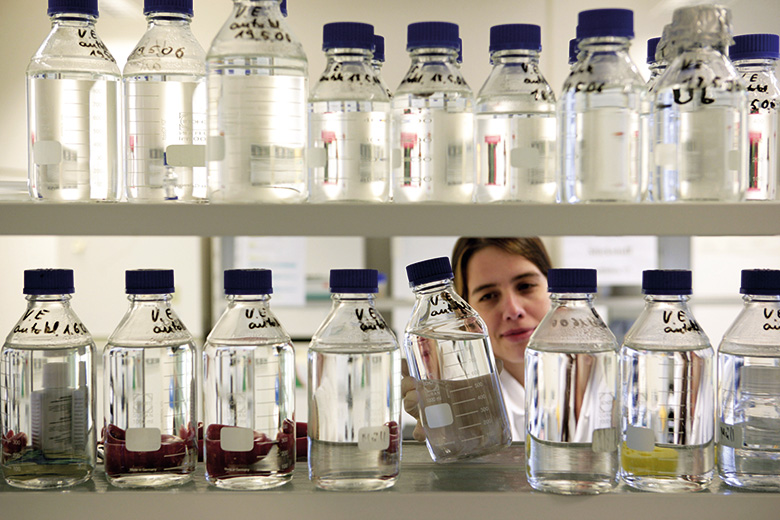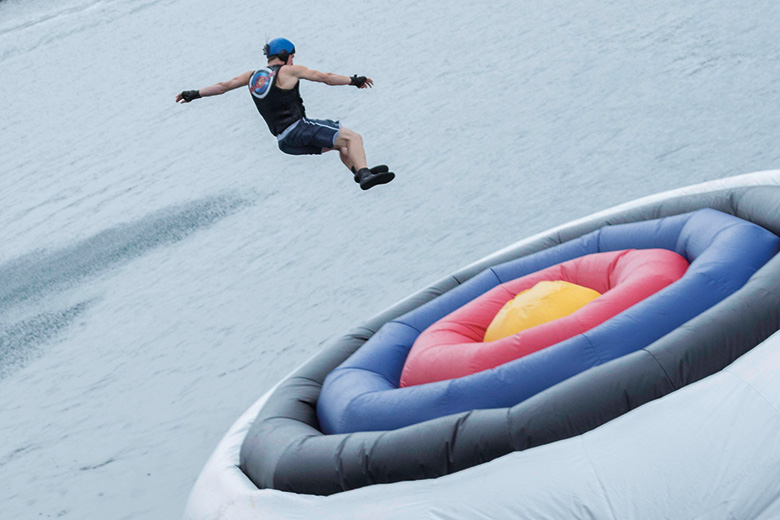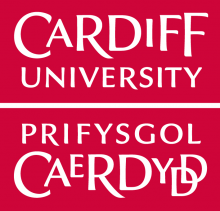Being an academic is double-edged. On the one hand, if you are lucky in your work, as I am, it has a magic characteristic that it shares with few other occupations: there is no distinction between work and life. I enjoy my work so much that, as I often joke, I would pay to do it. The downside is that you don’t know how to cope when they take it away from you. But one day I’ll have to give up, if only because I’ve become too demented to go on. So my new year’s resolution is to try to find some other activities that might keep me occupied when it’s all over. I’ve thought of pottery, but only in the long term because it is going to need some preparatory practice, for which I haven’t got time. I might try pétanque if the group I once spotted still meet in the nearby park; my proudest moment was beating a Frenchman we bumped into during a holiday in northern France – although maybe it was just the first move of a hustle. Pétanque hustler in retirement? I’ll start practising now!
Harry Collins is distinguished research professor of social sciences at Cardiff University.
My resolutions are variations on typical themes:
Don’t just resolve, plan! I know that nothing will go differently unless I truly make a new start. That article in the bottom drawer that has never been written will not write itself simply because it is a new year.
Spend less, save more. A truism for family budgets, but also for academic time management. I resolve not to put more effort into things than is needed and save my time for what is most important.
Lose weight. I intend to say no to at least one non-essential task or commitment per week.
Learn something new. To reinvigorate my research and myself, I plan to go to a conference out of my comfort zone and seek out collaborators who will provide new points of view.
Enjoy life by seeking balance. Need I say more? This year I really mean it.
Rachel Ankeny is associate dean of research and deputy executive dean in the Faculty of Arts at the University of Adelaide.
I’m pretty cynical about new year’s resolutions, but this coming year I am determined to spend less time on email. It’s one of the relentless curses of modern life. No matter how efficient I think I’m being in dealing with the onslaught of messages that appear each day, there are always more hanging around. And in our “always on” culture of smartphones, wi-fi, social media and instant messaging, there’s increasing pressure to respond promptly. This last year especially I’ve found myself checking my inbox at absurdly unsociable times in a futile attempt to clear the backlog. The lowest point was finding myself, on autopilot, checking at 3am after working an 18-hour day; I had to be ready for the school run and another day’s work three hours later. I knew then that, for my own sanity, I had to rethink how I was managing my online time.
Sarah Peverley is professor of English literature at the University of Liverpool.
I’m not usually one for new year’s resolutions (if it’s worth doing, do it now), but, this year, the new global politics has launched me into action. Although I do not have children, I have resolved to join the parents, teachers and friends association of my local state primary school. One of the big issues facing higher education is the gulf emerging between those who trust expertise and those who do not. Getting actively involved in my local state school is a way of strengthening the ties between the lowest and the highest levels of our education system. It is a way of building personal relationships with teachers and children and giving a human face to expertise. It is these public institutions that play such a big role in constituting the strength of our shared civil society.
Tamson Pietsch is a fellow in the department of history at the University of Sydney.
This year heralds the beginning of my fifth year at the helm of the University of South Australia. There have been six federal ministers for education since I arrived here and two sequential governmental attempts to “reform” the Australian higher education system – without any articulation of what (beyond a near-sighted budget imperative to reduce costs at all cost) specifically needs to be reformed in a system that has furnished so many of the world’s leading young (and older) universities, and which already contributes billions to the Australian economy as a services export industry. So I resolve to excel at expecting the unexpected while charting uncharted policy waters on stormy global seas.
David Lloyd is vice-chancellor and president of the University of South Australia.
My first resolution for 2017 is to recalibrate my work-life balance, working less and living more. I want to master the art of saying “no” to certain job-related demands on my time and start treating my weekends and evenings as occasions to care for myself, my partner and my friends. I love being an academic, but I need to remember not to neglect other, more important areas of life.
My second resolution relates to how I spend my work time. A colleague and I recently initiated an equity project at Auckland called Hidden Perspectives: Bringing the Arts out of the Closet. Inspired by the Hidden Perspectives initiative at the University of Sheffield, our project fosters a social and academic community for LGBTI+ (lesbian, gay, bisexual, transgender, intersex and related communities) arts students. Student support should be a key responsibility for academics, but it is too often overlooked. So, in 2017, I intend to give this project the attention that it deserves.
Caroline Blyth is lecturer in religious studies at the University of Auckland.

To progress in academia as a scientist is to gradually evolve from intrepid experimenter into administrative pencil-pusher. These days, it becomes increasingly difficult to leave the black hole of my computer screen, which sucks in all of my creative energy and spits back deadlines, rejections, rejoinders and tedious departmental email chains into which far too many irrelevant people are copied. Last month, dispirited by yet another pointless exercise not requiring a PhD (shortening a 532-word abstract into a breezy 496 – it looks less desperate if you undershoot), I wandered down the corridor and slipped into my lab. By chance, none of my team was there. I breathed in the calm stillness, the chemical tang, the sheer familiarity of the grey, metallic world of my chosen profession. And I resolved to fit in more lab time this year, doing science with my hands as well as my head.
Jennifer Rohn is principal research associate in nephrology at University College London.
My first resolution is a work-centric one. It is not dissimilar to the resolution I made in 2016 (and 2015, 2014 and 2013). It is to publish 10 papers in the same year and to get promoted! In some ways, this is the academic equivalent of saying that I will quit smoking and lose 2st (12kg) in weight: it is aspirational, but lacks the detail needed to achieve it.
The second resolution is a political call to arms, to myself and the whole academic community. I think it is fair to say that we, the experts, lost 2016. Somewhere in post-truth politics, our voices stopped being heard. In the next four years, the truths I hold to be self-evident – that vaccines work, evolution happens and the climate is changing – will be under attack and no amount of clever Facebook posts that I make to my like-minded friends will help defend them. I need to come up with better ways to get the message across: fighting rhetoric with reason, fear with facts and populism with pragmatism.
It’s going to be a long year.
John Tregoning is senior lecturer in the mucosal infection and immunity section of virology at Imperial College London.
In some ways, I slowed down in 2016. I withdrew from my higher education teaching position and moved everything I have to a studio by the Dutch seaside. For 2017, I want to accelerate. Buy more disposable electronic gadgets (a project on buying-as-research in digital culture, based in Kenya). Fire more guns (an exploration of the return of military firearms in public space across Europe). Have more sex over the internet and on night trains (practicebased research in digital sexuality, speed and networks). I want to push myself beyond a nostalgia for direct, localised action and contribute to an accelerationist critique of neoliberalism that embraces the complexities of technologically networked society. But, despite this determination to accelerate, I shall no longer drink from paper cups or handle plastic cutlery at academic events. We can’t afford to be cheap.
Daniël Ploeger is an artist and a research fellow at the Royal Central School of Speech and Drama, University of London.
I’m going to try and become as fit as I was when I was a student. It’s a big ask, since that was 30 years ago, but I’m determined to keep my place at centre back for the vice-chancellor’s football team at my university, for which I love playing. Tackling Ji Sung Park (who is studying for an MA here) last October was a career high.
My other resolution is to step up De Montfort’s commitment to our #loveinternational campaign. Prime Minister Theresa May’s claim that “if you’re a citizen of the world, you’re a citizen of nowhere” will be robustly challenged by more than 1,000 of our students, who we will be taking to New York in January as part of our international programme, DMUGlobal. I’m proud that UK universities are challenging the rampant insularity of so many politicians around the globe.
Dominic Shellard is vice-chancellor of De Montfort University.
My theme for 2017 is to take my own medicine. How much of the advice that I give my students do I actually follow myself? It is hard-won wisdom from years of training, so I might as well benefit from it. At the top of the list are:
Think more, do less. There is a tendency to prioritise tasks with tangible outcomes (write that grant, do that experiment) but reading and thinking are just as vital to productivity and creativity in a research enterprise.
Be more patient. With mentees, journals, funding agencies…Research is a long game and longevity means overcoming disappointment and continuing to push for your goals, whether education, publications or grants.
Both of these are about remembering why I do what I do – amid the hard work, allowing the joy of teaching, learning and investigating to come through.
Jessica Seeliger is assistant professor in the department of pharmacological sciences at Stony Brook University, New York.
Working in Hong Kong, it would be easy to be distracted from my main purpose of doing everything that I can to further the reputation of my university. There are so many noises off: local and regional political events and the media hype surrounding them. It must be similar in the UK, where pro-Brexit politicians said that people had “had enough of experts”, and in the US, where the divisive presidential election campaign was replete with anti-intellectual rhetoric. But we must not allow ourselves to be deterred from our principles and aims. We should remember that the world’s oldest universities have survived wars, plague, famine and social disorder. Education can and will ultimately provide the answer to mankind’s ills, and we owe it to society to ensure stability in our universities when all around us is disruption and uncertainty. So my resolution is simple: don’t be blown off course by external events.
Peter Mathieson is president of the University of Hong Kong.
Apart from my now perennial resolution to end the year lighter than I began it, I keep coming back to the example of Richard Hamming, mathematician, computer scientist and, according to his Wikipedia page, the wearer of some outstanding plaid jackets. Hamming was at the famous Bell Labs in New Jersey for 30 years immediately after the Second World War. By all accounts, he worked very hard, but he had the discipline to keep Friday afternoons free for “great thoughts”. It was his chance to step back and think about the big picture and the big problems in his field, which all too easily disappear amid the hurly-burly of everyday life. My own thoughts are not likely to be so very great, but I am determined to clear some time in my schedule to examine the larger landscape of research. At the very least, I may get some time to read some other people’s great thoughts. The things immediately on my mind are the tightly linked issues of research assessment and open science, and, in these post-Brexit times, how to make the sciences more relevant than ever to people’s lives.
Stephen Curry is professor of structural biology at Imperial College London.
I’ve only been in post at the University of Sussex since the start of September, so it’s a bit too early to turn over a new leaf. Whether we like it or not, however, UK universities need to stop mourning the European Union referendum result, recognise that the UK will leave the EU and do our part to make it work for our students, our staff and our country. There will be silver linings: it’s hard to imagine that research and development would have had such a generous settlement in the Autumn Statement in a pre-Brexit world. Internationally, British influence is waning, but our great universities remain widely admired and emulated forces for economic growth and positive social change. My resolution, then, is that Sussex will embody and promote globalism for the benefit of our region, our country and our partners around the world.
Adam Tickell is vice-chancellor of the University of Sussex.

I believe in specific targets rather than the kind of vague aspiration to kick bad habits that usually passes for a resolution.
One important thing that I’ve learned is to ignore my gut when it tells me that a newly formed goal is unachievable. Being persistent usually helps get me there.
The other big thing is to put targets in writing. Research shows that if you write your “next day” goals before you go to sleep, you have a better chance of accomplishing them. It works for me. I usually pick one thing from the list to try to make progress on, no matter what. It has helped me do a lot more than before – especially on the work that was most important. I believe that the same principle applies to longer-term resolutions.
So what’s mine? My last massive open online course, Learning How to Learn, became the world’s most popular. Now I’m flat out on the next one. My goal? To have it ready to go by 20 March 2017. There. It’s in print now, so how could I possibly fail?!
Barbara Oakley is professor of engineering at Oakland University and author of A Mind for Numbers and the forthcoming Mindshift: Break Through Obstacles to Learning and Discover Your Hidden Potential.
There’s an episode of the sitcom 30 Rock in which Jack Donaghy, a workaholic television executive, wakes up after a heart attack and claims that his life flashed before his eyes. “And all the time I’ve been on this earth I have only one regret,” he says. “I should have worked more.” I know how he feels. And I know that every academic likes to claim they work too hard. But can I just say: not me. At least not in 2016 – not with the distractions of politics and the news media. But I have a 2017 book deadline that I am determined to meet. Game on.
I also aim to buy fewer books. I work in a university with an incredibly well-stocked library, but over the past year or so I have found myself using it less and less. I think that this is because of the availability and convenience of online booksellers, who often offer free next-day delivery. This year, I am committed to making far better use of on-campus resources and saving my pennies too.
Katie Beswick is a lecturer in drama at the University of Exeter.
I never make resolutions because I break them…but…I want to make progress on my Sex in the Archives (not to be taken too literally) and Trans America books – at a time in my life where I have come to realise that I will not be writing books for ever. I hope, without much confidence, to remain cheerful as I negotiate my way through an academic office relocation for the second time in as many years, although perhaps I will find those books that I am sure were there after the first move. I plan to be gentle to my students, try to cease that involuntary eye-rolling in tutorials (which I am sure doesn’t help with fostering a free exchange of ideas) and to curb my acerbic comments on dissertation drafts: those track changes that look like multicoloured hedgehogs. And – not strictly higher education but too important not to mention – I resolve to stop watching Arsenal from behind the sofa – even though that is really up to Arsenal rather than me.
Barry Reay is Keith Sinclair chair in history at the University of Auckland.
In talking with scientists and academics about social activism, my own opinions about the mainstream definition and practices of “science” can get in the way of listening. More thoughtfulness and communication skills will help.
I resolve to seek as much concordance of my work life with my personal ethics as possible, without making a religion of my beliefs. I will own my beliefs publicly and always speak up to defend and discuss them, while remembering that I don’t have a monopoly on truth.
I will continuously query myself. Internally, I will assess my clarity and honesty; externally, I will monitor how my messages are perceived and how I am listening and responding. On work trips, I will seek out colleagues from other fields to talk and collaborate with. And I will practise sketchnoting – a combination of text and pictures – to summarise books, conversations, notes, lectures and papers, as well as to outline and illustrate presentations.
Kathleen Barker is clinical assistant professor at the University of Washington School of Public Health.
Every week, it seems, I resolve to be a more productive and organised academic. Last week, I was determined that I would file my papers instead of just letting them drift into shoals of pages on my desk. And yet my credit card bill is currently sitting on top of paperwork about a research networking scheme. That, in turn, is balanced on a medieval history book and my daily diary, which I have not properly filled in. If I’m no good at keeping weekly resolutions, how likely is it that I will keep any for a whole year?
Is that being realistic or self-defeating? Perhaps the trick is simply to make a different kind of resolution. So mine for 2017 is to stop making vague promises to myself – “be tidier”, “write more”, “get more exercise” – and each week give myself a specific goal to accomplish. Who knows, if I start January by pledging to “file all my conference paperwork this week”, by December maybe I will actually be in the habit of keeping a desk that looks more like a place of productive work than a slow explosion of despair. I live in hope.
Rachel Moss is a lecturer in late medieval history at the University of Oxford.
I will use Donald Trump’s victory in the US presidential election as a spur to work on socially relevant topics. I wasted far too many scholarly person-hours trolling the internet during the build-up to the election. I became very wonk-like on the subject of aggregate polls and voter sampling, feeling as if I needed to use all my professional skills to stay ahead of the news cycle. But since the (clearly) pseudo-science of polling has been debunked, I will invest my intellectual capital in a project that I’m starting on poverty. If anything, the events in politics show us that far too little energy in the university is being directed to those who suffer the most. We’re too interested in parsing the injuries to our middle-class way of existence and so far from concerning ourselves with those who never attend university and can barely gather the minimum requirements to exist. So, thank you, Donald Trump, for showing me how to make scholarship great again.
Lennard Davis is distinguished professor of liberal arts and sciences at the University of Illinois at Chicago.
POSTSCRIPT:
Print headline: From actual self to ideal self
Register to continue
Why register?
- Registration is free and only takes a moment
- Once registered, you can read 3 articles a month
- Sign up for our newsletter
Subscribe
Or subscribe for unlimited access to:
- Unlimited access to news, views, insights & reviews
- Digital editions
- Digital access to THE’s university and college rankings analysis
Already registered or a current subscriber?





